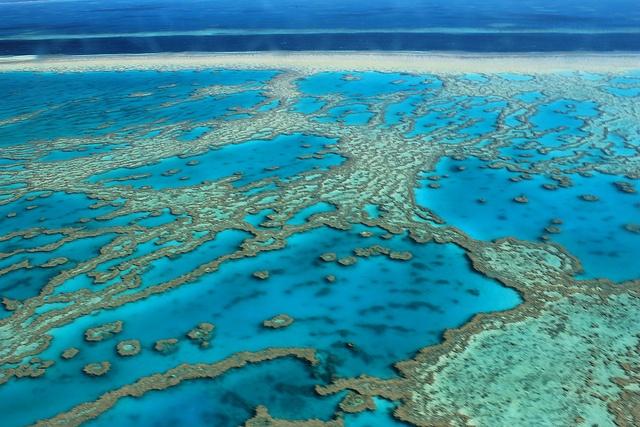
By Scott Huntington
The Great Barrier Reef is the world’s largest living structure. It’s about the same size as Germany or Japan and is so expansive that it can be seen from outer space. It contains 3,000 individual reefs comprising 600 types of coral. A vast range of fish, shark, ray, whale, dolphin and mollusk species call it home.
The Great Barrier Reef is one of the most beautiful, impressive and diverse natural areas on the planet. Recently, however, changes in the environment have been killing off coral and threatening this natural wonder.
What’s happening to the world’s reefs?
Recent diver surveys off the coast of Australia discovered that up to half the Great Barrier Reef was dead due to coral bleaching, a response to warm ocean water that causes the coral to eject the algae that live inside of it and give the coral most of its food and its color. If the temperature returns to normal, the coral can recover. If that doesn’t happen, however, the organism will die.
Scientists forecast that the warming will continue causing more reefs to bleach and potentially die off. If that happens, we could see a greater number of reefs being threatened by bleaching than ever before.
Why is it happening?
El Niño and climate change are two likely causes of this coral bleaching because they both cause ocean temperatures to rise. The increased level of carbon dioxide in the atmosphere from the burning of fossil fuels is also affecting the reef. As carbon levels increase, more of the gas dissolves in the ocean. This lowers the water’s pH, making it more difficult for the reef to develop — and recover from bleaching and other damage.
Pollution, overfishing, coastline industrialization and reckless tourism may also be causing damage.
What’s being done to stop it?
The Australian government said it will spend $965.3 million ($1.3 billion AUD) over the next five years on the health of the Great Barrier Reef. Australia will increase the frequency with which it surveys the ecosystem as part of its response and has set goals to reduce nitrogen pollution by 80 percent and sediment loads by half.
The site was almost placed on the United Nations' “in danger” list, but officials decided against the move. The Australian government is now scrambling to make sure it stays that way.
Many activists say the government still isn’t doing enough to protect the reef. One major criticism is that the government is not focusing enough on emissions from coal, which impact climate change and lead to coral reef damage. Environmental organizations, celebrities, conservationists and ordinary citizens are urging officials to do more and encouraging people to get involved by signing petitions and spreading awareness.
Is there hope?
A somewhat jokey obituary that circulated the Web recently mourned the death of the Great Barrier Reef, but scientists say it’s not dead yet. It is clearly in serious trouble, however. The Australian government must do what it can to improve water quality and reduce pollution, which will require changes in industry, regulations and lifestyle if it wants to save the reef.Global warming also must be stopped if we are to save this one-of-a-kind World Heritage Site — a responsibility that lies with the whole planet. Improving water quality will help give the reef a fighting chance. But ultimately, if water temperatures don’t return to normal, the coral will remain in life-threatening danger.
The Great Barrier Reef is not dead yet, but you could say it’s on life support. Pollution, warming oceans and greenhouse gases have caused some serious damage to the ecosystem. It will take some substantial changes, but it is possible that the Great Barrier Reef will one day recover.
Image credit: Flickr/FarbenfroheWunderwelt
Scott Huntington is a writer and blogger. Follow him on Twitter @SMHuntington.
TriplePundit has published articles from over 1000 contributors. If you'd like to be a guest author, please get in touch!














